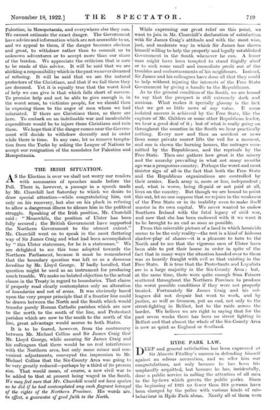THE IRISH SITUATION.
AS the Election is over we shall not worry our readers with summaries of speeches made before the Poll. There is, however, a passage in a speech made by Mr. Churchill last Saturday to which we desire to draw special attention—while congratulating him, not only on his recovery, but also on his pluck in refusing to allow a dangerous illness to silence him in the political struggle. Speaking of the Irish position, Mr. Churchill said : " Meanwhile, the position of Ulster has been fully secured ; the British Government have supported the Northern Government to the utmost extent." Mr. Churchill went on to speak in the most flattering way of Sir James Craig and what had been accomplished by " this Ulster statesman, for he is a statesman." We are delighted to see this tone adopted towards the Northern Parliament, because it must be remembered that the boundary question was left us as a damnosa hereditas by Mr. Lloyd George. If badly handled, that question might be used as an instrument for producing much trouble. We make no belated objection to the actual clause in the Treaty in regard to boundaries. That clause if properly read clearly contemplates only an alteration of boundaries and not of areas. It was obviously based upon the very proper principle that if a frontier line could be drawn between the North and the South which would transfer purely Roman Catholic parishes which are now to the north to the south of the line, and Protestant parishes which are now to the south to the north of the line, great advantage would accrue to both States.
It is to be feared, however, from the controversy between Mr. Michael Collins and Sir James Craig that Mr. Lloyd George, while assuring Sir James Craig and his colleagues that there would be no real interference with the Northern area, but only some minor and con- venient adjustments, conveyed the impression to Mr. Michael Collins that the Six-County Area was going to be very greatly reduced—perhaps by a third of its present size. That would mean, of course, a new civil war to be added to that at present being waged in the South. We may feel sure that Mr. Churchill would not have spoken as he did if he had contemplated any such flagrant betrayal of the rights of the Northern Province. His words are. in effect, a guarantee of good faith to the North. While expressing our great relief on this point, we want to join in Mr. Churchill's declaration of satisfaction with Sir James Craig's attitude and with the most wise, just, and moderate way in which Sir James has shown himself willing to help the properly and legally established Government in the South whenever he can. A lesser man might have been tempted to stand frigidly aloof or to seek some small and immediate profit out of the troubles and embarrassments of his neighbours. Instead, Sir James and his colleagues have done all that they could to help without injuring the interests of the Free State Government by giving a handle to the Republicans.
As to the general condition of the South, we arc bound to say that the prospect is still extremely dark and anxious. What makes it specially gloomy is the fact that we get so little news of any value. If some isolated success is achieved by the Free State, like the capture of Mr. Childers or some other Republican leader, we hear a good deal of it ; but of what is really going on throughout the counties in the South we hear practically nothing. Every now and then an accident or news from some private source lifts the veil for a moment, and one is shown the burning houses, the outrages com- mitted by the Republicans, and the reprisals by the Free State. Then one gathers how great is the misery and the anarchy prevailing in what not many months ago was a prosperous country. Perhaps the worst and most sinister sign of all is the fact that both the Free State and the Republican organizations are controlled by their armies. Each army is, more or less, independent ; and, what is worse, being ill-paid or not paid at all, lives on the country. But though we are bound to point this out, let no one suppose that we rejoice in the weakness of the Free State or in its inability even to make itself master in its own capital. We never wanted to endow Southern Ireland with the fatal legacy of civil war, and now that she has been endowed with it we want it to be brought to an end as soon as possible.
From this miserable picture of a land in which homicide seems to be the only reality—the rest is a kind of hideous shadow-play of shams—it is a pleasure to turn to the North and to see that the vigorous men of Ulster have been able to put their house in order in spite of the fact that in many ways the situation handed over to them was as heavily fraught with evil as that existing in the Free State. It is true that the Protegtants and Loyalists are in a large majority in the Six-County Area ; but, at the same time, there were quite enough Sinn Feiners scattered throughout the Northern Province to produce the worst possible conditions if they were not properly treated. Fortunately Sir James Craig and his col- leagues did not despair but went to work, and by justice, as well as firmness, put an end, not only to the street-fighting in Belfast, but to the raids across the border. We believe we are right in saying that for the past seven weeks there has been no street fighting in Belfast and that almost the whole of the Six-County Area is now as quiet as England or Scotland.






































 Previous page
Previous page